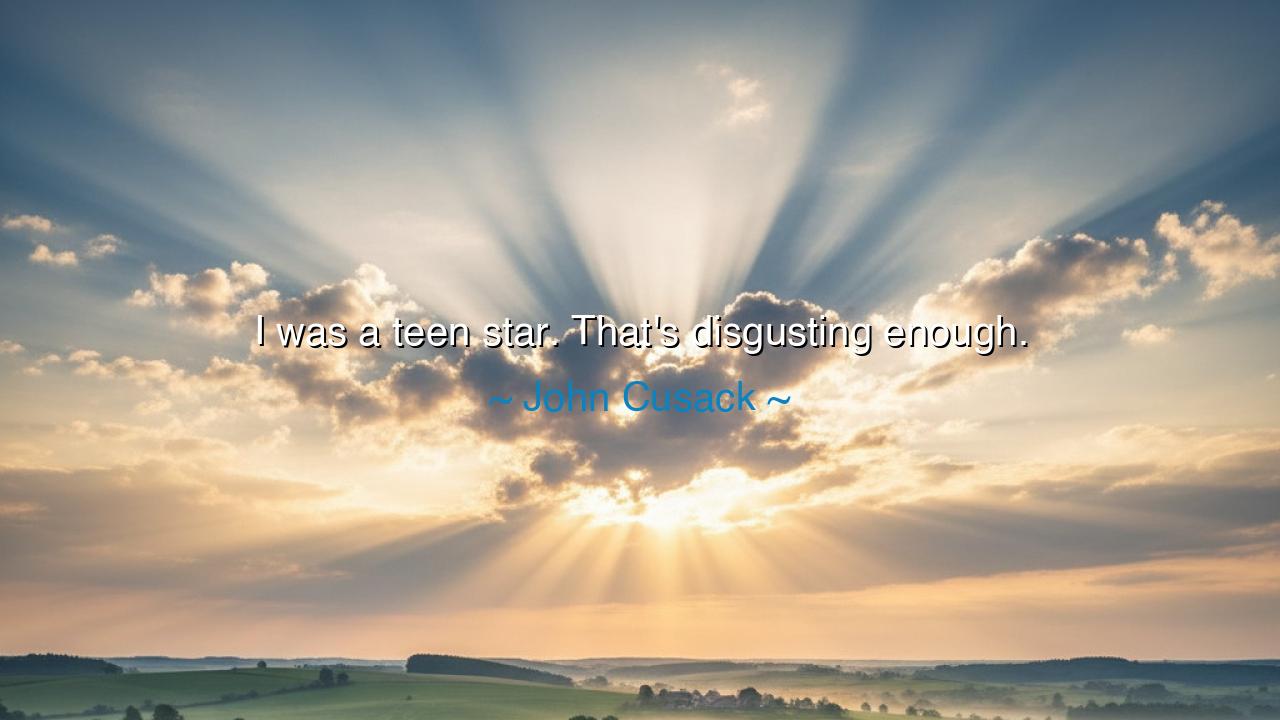
I was a teen star. That's disgusting enough.






John Cusack once remarked with sharp wit and unflinching honesty: "I was a teen star. That's disgusting enough." In these few words lies a complex meditation on the pressures, absurdities, and perils of youthful fame. To be a teen star is to be cast into a world of adoration, scrutiny, and expectation long before one has fully formed as a person. Cusack’s terse self-assessment captures the bitterness, the surreal nature, and the unsettling distortions of identity that come with being adored and objectified while still growing into oneself.
The origin of this statement lies in Cusack’s own childhood and teenage years in Hollywood. Rising to fame with roles in films like Sixteen Candles and Better Off Dead, he became the object of popular attention and industry pressure in a period of life meant for exploration and discovery. The statement “that’s disgusting enough” is not mere self-deprecation; it is a recognition that the machinery of Hollywood can warp adolescence, turning wonder and creativity into spectacle and expectation, leaving the young to navigate a world that is both intoxicating and corrosive.
History has long witnessed the burdens of youthful fame. Shirley Temple, adored worldwide as a child in the 1930s, was forced into roles, publicity, and scrutiny that few adults could endure gracefully. Similarly, Jean Simmons and Judy Garland faced early stardom, which often came at the expense of personal freedom and emotional health. Cusack’s reflection continues this lineage of awareness: to shine in youth under the world’s gaze is both gift and curse, a dual-edged sword that can wound as easily as it glorifies.
Cusack’s words also reveal a profound cynicism born of experience. The adjective “disgusting” conveys more than humor—it conveys revulsion at the unnaturalness of the situation. Childhood and adolescence are meant for growth, play, and gradual learning. To be elevated to the pedestal of stardom interrupts that natural progression, making every success, every compliment, every expectation laden with distortion. It is a cautionary insight into the unnatural pressures imposed upon those who rise too early.
Yet within this statement is also the seed of wisdom: self-awareness. Cusack does not pretend that fame in youth is glamorous; he names it for what it is. To acknowledge the discomfort, absurdity, and moral complications of early success is to gain mastery over it. By speaking plainly, he reminds us that recognition without grounding can corrode the spirit, and that it is only through honesty with oneself that one can navigate the treacherous waters of public attention.
The lesson for us is timeless: do not idealize superficial success, particularly in youth. Fame, wealth, and applause may glitter, but they carry hidden costs that are often invisible to the onlooker. True fulfillment comes not from the world’s admiration, but from integrity, self-knowledge, and the cultivation of one’s talents in alignment with purpose rather than spectacle. Cusack’s reflection warns young aspirants to balance ambition with humility and vigilance.
Therefore, children of tomorrow, heed John Cusack’s stark warning. Pursue your gifts, yes, but guard your soul. Understand that the world’s spotlight, when shone too early, can distort as much as it illuminates. Do not allow yourself to be objectified, idolized, or consumed by external adoration before you have the foundation of self to withstand it. Youthful stardom is seductive, but it can be corrosive—seek instead growth, wisdom, and mastery, and let your fame, if it comes, serve you rather than consume you.






AAdministratorAdministrator
Welcome, honored guests. Please leave a comment, we will respond soon